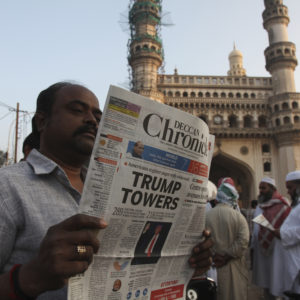The world anxiously awaits clues to President Trump’s foreign policy agenda. But unlike an episode of “The Apprentice,” there’s no big reveal in store.
In just over a month, Trump has shredded decades of foreign policy achievements, thoughtlessly rending the delicate fabric of world order. He has reversed Republican orthodoxy on trade liberalization and foreign investment. He has ambivalently abandoned half-century-old alliances and inexplicably embraced Russian autocrat Vladimir Putin. And he has carelessly cast aside America’s longstanding commitment to a two-state solution for Middle East peace, imperiling Israelis and Palestinians alike.
Those searching for patterns in the President’s words and actions could be forgiven for concluding that the new administration is charting a radical new course for America. But the evidence points to a more chilling conclusion: President Trump has no foreign policy to speak of.
Trump’s rhetoric on the campaign trail revealed little of his foreign policy agenda, but his silence spoke volumes. He articulated no grand strategy for world affairs, and he offered little in the way of a global agenda aside from his ill-conceived promise to build a wall on the U.S.-Mexico border. His supporters and a critical mass of the American electorate didn’t seem to care. But that will change once the costs of Trump’s impulse-driven approach to foreign affairs begin to mount.
In the arc of history, the Trump presidency will be a bizarre outlier. But the damage left in Trump’s wake will take decades to repair. For nearly a century, the world has looked to the United States for leadership in a world prone to violence, sectarianism, and instability. Indeed, America’s entry into world affairs in the early twentieth century began a new chapter in global affairs—a chapter the Trump Administration’s strategic ambivalence threatens to end without closure.
Those unmotivated by President Trump’s irresponsible leadership have no business seeking to supplant him in the Oval Office. Indeed, those still mulling whether to challenge the president in 2020 may already be too late. The President’s recent campaign style rally in Florida leaves no doubt that the next presidential race has already begun.
The next commander-in-chief will inherit a world in disarray. Terrorism, energy insecurity, climate change, and economic stagnation will await the 46th President of the United States, whoever he or she is. But the next president will have to confront those challenges with considerably fewer tools at their disposal. America will enjoy diminished confidence among our allies, and little will have been done to stem the flow of power and influence being amassed by China and a resurgent Russia. In short, America’s problems will be complex and manifold. And the stakes will be considerably higher.
With so much on the line, it’s imperative that those aspiring to replace President Trump hew to constructive rules of engagement. Ideas must be debated openly and honestly, with a renewed commitment to fact-based assertions and evidence-driven ideas. And most importantly, leaders must engage meaningfully with working class Americans, who have—to the detriment of many would-be politicians—been heretofore excluded from the foreign policy dialogue.
The time to contemplate the 2020 presidential campaign has come and gone. Those still smarting from November’s outcome can afford to sulk no longer. We’re neck deep in the 2020 campaign. And time lost is time wasted.

